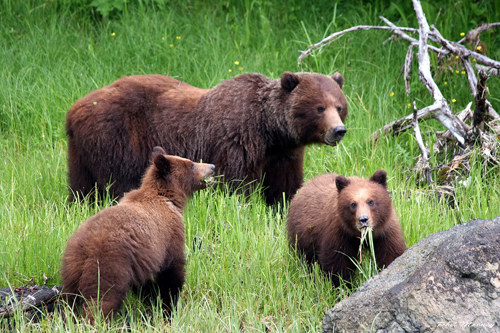It’s March, and brown bears will start emerging from their dens in the next couple of weeks with one thing in mind: Food.
Last summer and fall, bears struggled to find enough berries and fish to eat. Some were out as late as December trying to stock up on calories for their winter hibernation.
When bears leave their dens, Alaska Dept. of Fish and Game biologist Phil Mooney says they become eating machines.
“There’s really two things that drive bears: It’s sex and it’s food,” Mooney said. “It’s that simple. The breeding season is about the only time that it shifts to that urge to breed. And the rest of the time, they’re looking for food.”
In their natural environment in early spring, bears subsist mainly on grasses and sedges, which Mooney calls a ‘dry salad’ compared to the buffet of steak and seafood options available around humans.
“If you just total up the number of calories you can get from the stuff we throw away versus a bear,” he said, “especially this time of year, coming out and trying to get that type of quality food, there’s no comparison.”
Human food waste is like a drug for bears. Once they know it’s there and get used having it around, it becomes really tough to keep them from coming back.
“They’re gonna hit the can,” he said, “and they’re going to keep coming back for that can even if you try to change your ways immediately and clean the thing out and bleach it or whatever. The bear’s gonna come back to that spot and he’s going to keep checking it until he finally tires out and goes someplace else.”
He says it’s important that everyone properly dispose of garbage all year long. He says bear reports come in year-round, and it takes the whole neighborhood being diligent with their waste.
“You can have everybody on the street, say 9 out of 10 houses on a street, do it perfectly, and have one person who doesn’t want to do it,’ said Mooney. “The bear comes in there and once they come in, they’re going to check every single can.”
Authorities recommend that people freeze any food and animal parts, put baby diapers in a separate, sealed container, and make a trip to the transfer station on Jarvis Street. Everyone is allowed to dump up to 200 pounds of waste per month for free.
If you can’t make it to the transfer station, the next best thing is to wait and put smelly waste in the trash can the morning of garbage day.
If you spot a bear and it is not a threat, Mooney says you should call the business line at the police station at 747-3245. He says they record the reports and use them to track bear activity in the area.
































